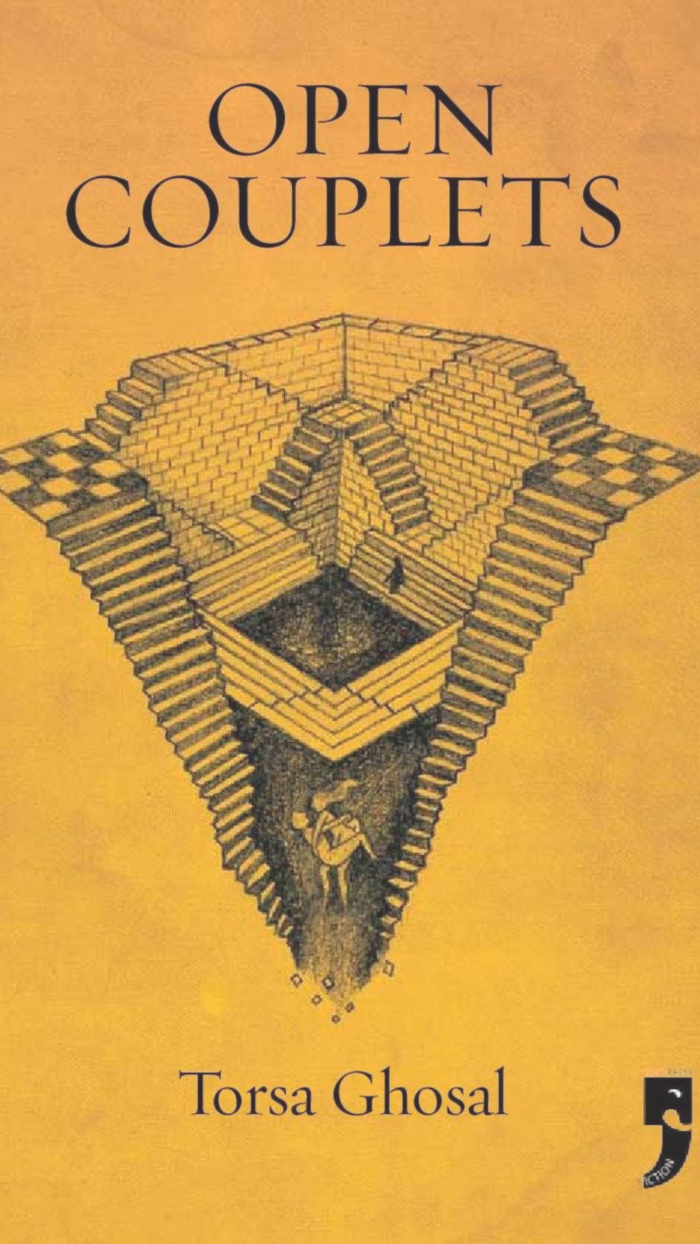
Published by Yoda Press, India. Buy worldwide: Amazon | Buy in India: Flipkart; Juggernaut; Amazon
Somewhere in the dingy lanes of north Kolkata, a young girl born to a family of idol-makers learns to carve goddesses with her own hands, a right that her artisan father had reserved for her brother. But, years later, when Ira Chatterjee—a breezy, jet setting ethnographer born in the same neighborhood—comes looking for the girl, no one knows where to find her.
Elsewhere, in the middle of America, Ira lives with a friend of a friend—Fasahat Zaidi, a poet, translator, but mostly, a raconteur extraordinaire from Lucknow. One day Fasahat is reciting ghazals in a bar in a saree; another day he is emailing Ira outlandish tales starring the likes of Meer and Insha. Until one day he goes mysteriously missing and no one can tell what became of him.
Determined to find those who nobody remembers, Ira embarks on a labyrinthine journey, a chimera-chasing adventure, only to confront her own state of oblivion.
Reading like a well-constructed puzzle that darts back and forth in time, this book challenges readers to have a crack at it.”
Biblio: A Review of Books
“The complex plot laid out with lyrical writing makes it impossible for the readers to not lose themselves within the pages. From cross-dressing poets to gay social activists, the book is filled with characters that challenge and broaden the idea of gender expression of South Asian communities.”
Constructing the narrative primarily through a series of emails, Ghosal brings readers in with powerful concision.”
World Literature Today
Read More >>
Asian Age / Deccan Chronicle
“Debut novelists slated for 2017 that are already being spoken of highly include Prayaag Akbar’s Leila, George Saunders’ Lincoln in the Bardo, Tor Udall’s A Thousand Paper Birds, Torsa Ghoshal’s Open Couplets and Devi Yashodharan’s novel, Empire.”
Jaya Bhattacharji Rose
Feminism in India
“Ghosal’s novel gracefully shifts between the settings of Kolkata and America as the gripping narratives shift between the two quests. The complex plot laid out with lyrical writing makes it impossible for the readers to not lose themselves within the pages. From cross-dressing poets to gay social activists, the book is filled with characters that challenge and broaden the idea of gender expression of South Asian communities.”
FII Team
Biblio: A Review of Books
“…Reading like a well-constructed puzzle that darts back and forth in time, this book challenges readers to have a crack at it, but, we will do well to heed the title. An open couplet is defined as a couplet with run-on lines, one that doesn’t offer any single meaning alone. And Ghosal’s story spills out from precisely the ellipses that we fill in, speculate about all that’s left unsaid, follow all that’s hinted at, sometimes arriving at a dead end in the bhul-bhulaiya (maze) of memory, as Ira tries to locate Zaidi and the elusive woman idol-maker.”
Shalini Mukerji
Muse India
“This novel is unique in the sense that the 11 chapters that constitute it are made up of a series of email correspondence…To unravel all these tangles – whether Ira Chatterjee succeeds in finding the young girl; why Fasahat has to be draped in a sari in order to recite ghazals in the bar; what are the outlandish tales he narrates to Ira; whether Ira will track down the missing Fasahat – to know them out, you have to take a plunge into the book, for then only you will experience an adventurous thrill.”
U Atreya Sarma
Desi Writers’ Lounge
“…this is not a book that pulls you down with philosophy – that is left to the reader’s interpretations – it is in fact one that mirrors all the distractions of life as we know it today, not indulging you with leisure as you once understood it. The back-and-forth emails, texts – replete with emojis – interspersed with rambling interview transcripts, which cut to flashbacks of fables from another era, ensure that you, the reader, too are circling a maze in your own mind.”
Pooja Pande
World Literature Today
“Constructing the narrative primarily through a series of emails, Ghosal brings readers in with powerful concision.”
Nota Benes Section
On Arts and Aesthetics
“Open Couplets – the strangest novel that I have read since Wyl Menmuir’s Booker-longlisted The Many (2016) – is published by Yoda Press of New Delhi…
“[T]he plot of Open Couplets revolves around Ira Chatterjee…As Ira finds herself deeper and deeper in the messy alleys filled with artisans and lifeless statues, she “dreams of walking amid mirrors”, hoping for clarity, perhaps wanting to see herself and everyone who has touched her life for what and who they really are.
“…Open Couplets is a thought-provoking effort that announces the arrival of a notable literary talent. While the book celebrates unconventional lifestyles, it also pokes fun at them, and reveals to us their many pains, complexities and challenges.”
Tulika Bahadur
Cafe Dissensus
“At a seemingly innocuous juncture in Torsa Ghosal’s Open Couplets, a minor character narrates an uncanny tale set in a gargantuan, maze-like historical structure, a ‘Bhulbhulaiya’. It is a startling vignette that captures the essence of this complex novel…Open Couplets is undeniably ambitious for a debut novel…a pioneering work in South Asian literary fiction in its exploration of gender and sexuality.”
Sourya Chowdhury